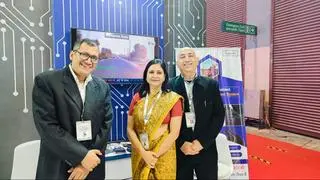Vishesh Rajaram, Managing Partner, Speciale Invest, a seed-stage venture capital firm, says their strategy is to invest in companies that are disrupting some form of technology. The idea being, by investing in such companies, Speciale Invest will move the needle both for its investors and the companies. A substantial part of the capital it invests will go towards innovation and in people for innovation versus investing in marketing and customer facing businesses.
“From the beginning,” he says, “there was a natural inclination towards investing in enterprise companies and the inclination skewed towards companies that had some sort of deep innovation. That has been the core to our belief and that has been the core to what we have been living through our investment strategy.”
Speciale Invest recently closed its first fund of ₹100 crore, all from domestic investors – family offices and small corporates. These are people who are running their traditional businesses and possibly see an opportunity to have a perspective for disruptive tech. Speciale Invest will put in ₹3-7 crore in a venture, over multiple rounds, and look to pick up stakes of about 20 per cent. It hopes to invest in 15-18 ventures from its first fund.
According to Vishesh, they see about 150 investment proposals a quarter, which means they have seen a little over 1,000 deals. A third of the proposals come from working with academic institutions like IIT- Madras and IISc Bengaluru, and the balance from the VC firm‘s founders’ network, accelerators, in-bound emails and entrepreneur references.
“We expect two-thirds of our companies to be building software products,” says Vishesh. And, within that space, he believes cloud, artificial intelligence will be areas of focus. Within AI itself, he sees a lot of scope for convergence of voice and AI and has two such companies in its portfolio already.
What does he look for in a venture since they are most often the first institutional investor? “Frugality and tenacity are the two qualities we look for,” says Vishesh. Are these guys thinking big, their ability to be innovative or carry out the disruptive idea that they have and frugality. “Do they have the tenacity to live through the rough life and can they be frugal enough to survive it,” says Vishesh. He explains that their notion is to invest in somebody who knows the risk they are taking, who believes this is a risk worth taking and building it out.
The big challenge
According to him, they try and find out if the idea is different enough and is it worth anybody’s risk, time, money and effort, and are the entrepreneurs committed to the cause. He says the big challenge of investing in deep tech start-ups is are you investing enough for you to achieve a certain amount of milestone that you can raise another round of capital. If you are not investing enough and the milestones planned are not sufficient to raise the next round of funds, it gets really challenging. Also, capital may not be available for all types of deep tech ventures.
Vishesh believes that there is good talent available in India to build deep tech products. Of course, not all products will have customers in India. For enterprise applications, India is still an early market, but it will evolve over time. At the moment, the overseas market is more appealing from an acceptance point of view and the average selling price that the product can command. “We strongly have a hypothesis for building companies out of India for global markets. We have four product businesses and three of them have customers from outside the country. One has already moved base. FrontdeskAI, for example, has now moved base to Palo Alto,” he says.
On fund-raising
On whether ventures should raise capital only when they need the money or opportunistically, Vishesh says he believes that companies should raise money when there is an opportunity to do so.
“I have seen more successes there than the other one where you try and over-engineer the capital structure, wait for the optimum time to raise capital. I don’t necessarily believe there is an optimum time to raise capital. If the outcomes are large, it will make a lot of sense for everybody. In a close to being perfect market, everything gets priced approximately over a period of time and everybody then makes their proportionate share of wealth to the risk they are taking,” he adds.








Comments
Comments have to be in English, and in full sentences. They cannot be abusive or personal. Please abide by our community guidelines for posting your comments.
We have migrated to a new commenting platform. If you are already a registered user of TheHindu Businessline and logged in, you may continue to engage with our articles. If you do not have an account please register and login to post comments. Users can access their older comments by logging into their accounts on Vuukle.